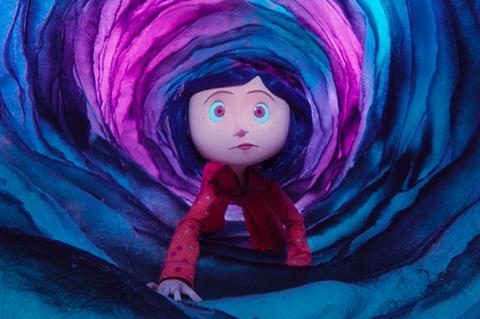
The commercial potential of re-releasing archive titles in cinemas is not news to the US studios, which are increasingly looking for spots in the calendar to reissue classic titles. And especially what may be termed modern classics: films that resonate with audiences who perhaps first saw them – in theatres or at home – 10 to 20 years ago.
But the success of last week’s 15-year reissue of Laika stop-motion animation Coraline – by Fathom Events in North America and Trafalgar Releasing in international markets – is currently concentrating minds in both distribution and exhibition.
Re-released in both 2D and 3D on August 15, Coraline opened with a four-day $20.2m – comprising over $12.5m in North America and more than $7.6m across an initial 32 international markets. These numbers saw the film rank fifth globally for the August 16-18 weekend, if Thursday takings are included. Yesterday (August 22), the global box office stood at $27.3m.

While confident that the film would resonate with the Laika fanbase, the partners have found themselves surprised by the scale of success. “This is way beyond our expectations and our highest projections,” said Kymberli Frueh, SVP of programming and content acquisitions at Trafalgar Releasing.
“We felt pretty confident, but I have to admit, I didn’t quite see this outcome,” added David Burke, chief marketing and operations officer at Laika. Burke now believes the full run of the film, which has yet to open in key international markets such as France (delayed because of the Olympic Games), will reach $40m.
The success of the anniversary reissue is disproportionate to the box office for the original 2009 release of Coraline from Focus Features in North America and Universal Pictures internationally: $124.6m.
In other words, the 15th-anniversary re-release has already reached 22% of the box office achieved for the original release, and looks set to reach 32% of it.
For the four-day opening, 3D screens delivered 62% of the box office globally. The top markets after six days were Mexico ($3.6m), UK/Ireland ($2.1m), Australia ($627,000) and Brazil ($562,000).
Laying the groundwork
For Burke, Laika’s first major global re-release is the culmination of a five-year plan, which saw the company focusing on nurturing all its social channels including TikTok, Instagram and YouTube. Despite not having a new film to shout about in this period – the company’s last was 2019’s Missing Link – Laika was able to grow to “an aggregation of about 10 million-plus followers”, revealed Burke.

Laika did, however, have plenty of assets relevant to social channels. “We had years of archival footage that is time-lapse friendly, that has super-detailed close-ups of the real props that we make, the real puppets that we make, the real sets that we make,” said Burke.
“We had these pieces that you would drop that would go viral that any company releasing a [new] movie next month would be delighted with. We were dropping content after content.”
Successful business on Laika’s e-commerce store, as well as its consumer licensing programme, gave further encouragement.
Laika’s relationship with its fans also proved useful to its distribution partners – especially for international, where the appetite for Laika re-releases was less proven. (Fathom had already had success in 2021 and 2023 with time-limited re-releases of Coraline.)
“Laika did an amazing job of knowing where those fans were, which helped us carve out the release schedule,” said Trafalgar’s Frueh.
Leveraging Laika’s social reach – and via cast and crew, including Neil Gaiman, who wrote the 2002 novella that provides the original source to the film – gave the digital campaign plenty of bang for a limited buck.
“We spent very little,” commented Burke. “I’ve worked in distribution for 20 years. There’s no comparison [with a new title] in terms of actual media spend.”
Re-release surge
For cinema operator Vue, which operates in 10 markets and is headquartered in the UK, the recent surge in re-releases fitted with an already-existing strategy to complement new releases with archive content.

The strategy gained speed when cinemas reopened after the first Covid pandemic lockdown, and commercially strong new releases were sparse. “That allowed experimenting with a lot more re-releases,” explained Robert Lea, head of screen content for UK and Ireland.
“We’ve seen it dramatically grow over the last few years. Box office for re-releases was up 50% on the year before in 2023, and 2024 is going to be even bigger.”
Lea emphasises the importance of special dates in the annual release calendar, including Star Wars Day (May 4), Mean Girls Day (October 3 – relating to a line of dialogue in the film) and Alien Day (April 26, aka 4/26, because in the original Alien the creature was discovered on a moon named LV-426).
For Vue, one upside is that “these classic titles don’t need the same sort of showtimes coverage that a new film does”, and they typically concentrate the audience into a single week or a few days. Coraline is unusual in being held over for a second week of play, due to its success.
“It’s all about celebrating the films, seeing it with like-minded fans, and you want high-occupancy sessions,” said Lea.
Commercially successful re-releases tend to be from the relatively recent past, rather than from cinema’s various golden ages, and Vue this year ran a successful season commemorating 25 years of 1999, with the likes of The Matrix and The Mummy. The term “new nostalgia” has been applied to the phenomenon of audiences embracing such titles, while Lea points to fans “reclaiming” films that were often not originally endorsed by critics.
Disney re-released Star Wars: Episode One – The Phantom Menace to coincide with the film’s 25th anniversary and Star Wars Day, grossing $19.4m globally. Sony is currently re-releasing all eight Spider-Man films (starring successively Tobey Maguire, Andrew Garfield and Tom Holland) at weekly intervals, and has grossed more than £900,000 in UK and Ireland with the first three.
This Friday sees Paramount re-release Pulp Fiction into 420 UK and Ireland cinemas, and upcoming this year are re-releases including Interstellar (10th anniversary), Mean Girls (20th anniversary) and Shaun Of The Dead (20th anniversary).
Christmas brings an annual splurge of festive re-releases – which each year includes The Nightmare Before Christmas, directed by Coraline director Henry Selick. The strong 2024 Q4 slate for new titles will create fierce competition for screen space, but Lea remains confident the festive films can slot in.
Meanwhile, Laika, which is eyeing a late-2025 release for its next new title Wildwood, is honing its re-release plans off the back of Coraline’s success.
“It’s about making sure that we have the time and the runway to deliver on a campaign based on a conversation with the fans, and an engagement with fans,” said Burke. “It’s not a smash-and-grab, or a ‘let’s get everything out’. We want to make sure that it feels authentic.”

























No comments yet